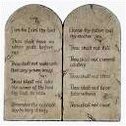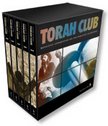As each of us approaches the Torah with a unique background, experience, maturity level, personality, and relationship with G-d, we also walk out our faith according to the commandments in different ways and at different speeds.
In other words, your mileage may vary. :)
Below is a list of my recommendations for getting started in Torah.
General Recommendations
 Do:
Do:
- Keep the focus on G-d.
The purpose of anything we do regarding Torah should be to honor and obey the Heavenly Father who called us out of darkness into light. Messiah Yeshua is the perfect example we seek to follow.
- Read Torah.
Torah points to Messiah and teaches us how He lived. If we are to be His followers, then we should live as He lived and walk as He walked: in the Torah.
- Pray.
Seeking G-d in prayer can be one of the most rewarding ways to spend our time.
- Do mitzvot.
Examine the commandments, learn about them, and do them... to walk as Yeshua walked. Remember that not every commandment applies to every person at every time. Without the Temple, we can't genuinely perform most of the commandments in the Torah.
- Ask questions.
But examine everything carefully; hold fast to that which is good. (1 Thessalonians 5:21)
- Read history.
Learn more about the context in which various parts of Scripture were given.
 Do not:
Do not:
- Skip the Apostolic Scriptures (New Testament).
There are many insights into walking out Torah that can be found in the Gospels and Epistles.
- Forsake assembling with other believers.
While we may not always agree on details, faith in Messiah Yeshua is our common bond.
- Think any one person or group "has it down" or "has it all figured out".
We are all learning and growing.
- Be compelled to do anything beyond the plain reading of Scripture.
"Who are you to judge the servant of another? To his own master he stands or falls; and he will stand, for the Lord is able to make him stand." (Romans 14:4)
 Have caution:
Have caution:
- Studying traditional Judaism if you aren't a Jew.
Many exciting insights into Torah can be gleaned from traditional Judaism. But, unfortunately, some Jewish authors are strongly anti-Yeshua, and their writings contain errors of which we should be extremely cautious.
- Sharing too much too quickly with friends and family.
In our zeal for G-d and His ways, we may not communicate clearly or come off as abrasive or even hurtful to those who aren't on this path.
- Moving too quickly to adopt customs not found in Scripture.
Torah communities often have many beautiful traditions and customs not commanded in Scripture. Learn to recognize the commands, traditions, and differences between them.
- Making too many changes at one time.
There is such a great treasure to be found in Torah that we can be overwhelmed by trying to change too much at one time. For family members (spouses, children, parents) who are not as zealous for Torah as we may be, the number of changes by itself can be overwhelming.
- It is cliche but true: we are running a marathon, not a sprint.
Take your time, and seek G-d's wisdom, instruction, strength, and guidance.
Places to Start
G-d
Everything we do in our Torah walk, from prayer to Scripture study, wrapping tefillin to honoring the Sabbath day, should be focused on honoring our Creator and walking in obedience to Him (Micah 6:8, 1 Cor 10:31). Apart from a right relationship with Him through Messiah Yeshua all the mitzvot in the world are worthless (Isa 64:6). It is his Holy Spirit that leads and guides all believers. Therefore, we should listen to Him in all things and make Him the center of every act.
 Scripture
Scripture
Reading through the whole of Scripture in an accurate, modern-English translation and connecting with G-d through his Word is of the utmost importance. Therefore, although the study of Scripture in its original languages is best, the New American Standard Bible is our choice of English translation for accuracy over any other currently available translation.
Although not a "word for word" translation, Stern's Complete Jewish Bible is enlightening because it brings the Jewish "flavor" of the Scriptures to light.
Online resources like BlueLetterBible.com and BibleGateway.com offer the NASB online for free. Our recommendation for printed Bibles can be found on ChristianBook.com. It is a simple, single-column format of the NASB translation without much commentary or other notes to distract from the Scripture itself.
 Prayer
Prayer
For millennia the Psalms have been the prayers of G-d's people. There are 150 of them. You can read and pray one each day. You can cover the whole book two times a year!
For traditional liturgical prayer, I recommend the Artscroll Siddur (Sephardi). Three prayer times correspond to the times of sacrifice outlined in Scripture.
- Evening [Maariv]
- Morning [Shacharit]
- Afternoon [Minchah]
All three are covered in the siddur [prayer book], along with special prayers for the Sabbath and the holy days.
It is my experience that our private prayers have been enhanced when preceded by liturgical prayer focused on praising, thanking, and extolling G-d and His mighty works.
 Specific commandments
Specific commandments
- Honor G-d.
Think about the words you say, the things you do, and the thoughts of your heart.
Practice putting G-d first.
- Keep the Sabbath.
Friday sundown to Saturday sundown is the Scriptural Sabbath day.
Start simple and build on making the day special and set apart for G-d.
Read Scripture. Pray. Avoid work and "regular" activities wherever possible.
- Eat foods that G-d says are acceptable.
Read G-d's commands regarding food in Leviticus 11 and Deuteronomy 14.
- Keep G-d's appointed times [moedim].
You can read about these moedim in Leviticus 23.
- Guard your speech.
Speak words of kindness and encouragement (Leviticus 19:16, Ephesians 4:29)
Thoughts for men:
- Wear tzitzit. (Numbers 15:37-40)
- Wrap tefillin. (Deuteronomy 6:8, 11:18, Exodus 13:9, 13:16)
- Grow a beard. (Leviticus 19:27)
These are relatively simple matters, but as we are faithful with little, we will become faithful with much (Luke 19:17). In all of this, we should grow to be more like Messiah. Act justly, love mercy, and walk humbly with G-d (Micah 6:8 KJV).
Larger issues:
- Honor your wife. (1 Peter 3:7)
- Raised disciplined children. (Ephesians 6:4, Proverbs 13:24)
Thoughts for women:
- Observe the commandments of menstrual impurity. (Leviticus 15:19-24)
- Dress and speak modestly. (1 Timothy 2:9-10)
Larger issues:
- Honor your husband and be under his authority. (Colossians 3:18, 1 Peter 3:1-2)
- Love your children in faith, with sanctity and self-restraint. (1 Tim 2:15, Titus 2:3-5)
 Torah Club
Torah Club
I and several of the members of my congregation have been immeasurably touched by First Fruits of Zion's (FFOZ) Torah Club study program. It is a year-by-year study that grounds students in Torah basics, points out Christ in the "Old Testament", teaches about the prophets, examines the Gospels, and revisits the whole of Scripture with a focus on walking as our Messiah walked.
FFOZ also has numerous other print and online resources to help those new to Torah. Please remember that FFOZ is but one voice in a chorus of many who seek to encourage others in Torah observance.
<><
